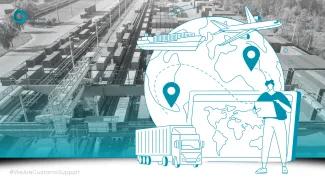There is 0%-tariff access for products traded between the European Union and the United Kingdom, but only if the products originate from either the EU or the UK.
No Duty on “Originating Goods”
One of the most important parts of the agreement is that there is no duty impact in the case of proven originating goods. These originating goods are products originating from either the European Union or the United Kingdom, based on the customs preferential rules of origin.
Implications for Your Products
There are a few steps to consider in determining the origin of your products:
- Determine the tariff classification of the product
- Review your product and check if your product is subject to import duties in the UK or EU
- If duties apply, check the origin based on the general rules of preferential origin
- Make sure to check that your product is not ruled out from preferential treatment because of insufficient processing.
- When is a Product “Originating’?
There are two ways in which a product can be considered ‘originating’.
First, the product can be exclusively produced or obtained in the territory of one country, without using material from another country. No manipulation or change in another country is allowed, other than certain minimal processes to keep them in good condition. This is called: wholly obtained.
Second, the product has been substantially transformed. In that case, the Product-Specific Rules apply (PSR). These PSR are stipulated in the form of either:
- A change of tariff heading
- Specific manufacturing or processing
- The ad-valorem, or ‘value added’ rule
How to Demonstrate Origin
Importers need to demonstrate that their goods qualify as originating and are eligible to claim preference. There are two ways to apply for preference.
The first one is a Statement on Origin which is completed by the exporter on a commercial document. The statement on origin text can be found here.
The second one is called Importer’s Knowledge. In the case of importers knowledge, the burden of proof lies with the importer. The importer needs documentation from the exporter that shows that the products supplied are of preferential origin. Whether the Customs Authority agrees with the origin depends on the quality of the documents. As the importer has little or no influence on the documents the exporter is providing, Importer’s Knowledge is not recommended to prove origin. The exception to this can be when the trade is an intercompany transaction.
The Challenges of Determining Origin
Determining the origin when the products come from a single source with only a few components is relatively easy. When there are many components from many origins, it gets complicated. The requirements for origin vary by country, so what can be deemed of EU preferential origin in one country, could well be deemed from Chinese origin in another country.
Another challenge is proving the origin. Preferential origin always has to be proved with documentation. If certain components were bought and re-sold several times documents are required from all these steps. If components were processed in one of these steps it gets even more complicated.
If your product contains components from both the European Union and the United Kingdom you can apply bilateral cumulation. Bilateral cumulation operates between two countries where a free trade agreement or autonomous agreement contains a provision allowing them to cumulate origin. Only originating products or materials can benefit from it.
Make Sure Origin is Determined Correctly
In some cases, you can still benefit from preferential rates, even if your product doesn’t meet the requirements for origin completely. There is a 10-15% tolerance that might apply.
If you want to make sure you have correctly determined the origin of your products and that the documents proving that origin are all in order, have an expert look at it. Our consultants are trained and have broad experience when it comes to determining origin, evaluating proof of origin and helping you solve any evidentiary gaps there may be.
When origin is not determined correctly you will be denied preferential rates, you may also incur fines or your goods may be denied entry into the country.
Sending Goods Back and Forth with preferential tariffs?
Companies that ship goods back and forth between the European Union and the United Kingdom for example for processing should beware that preferential origin is not forever. If you have proven the origin of your product and you have imported it using the preferential rate, your product loses its preferential status.
Empowering Global Trade
If you have any questions about preferential origin, proof of origin, statement on origin, importer’s knowledge or any other question related to the trade between the European Union and the United Kingdom under the new Trade Agreement, contact one of our specialists















